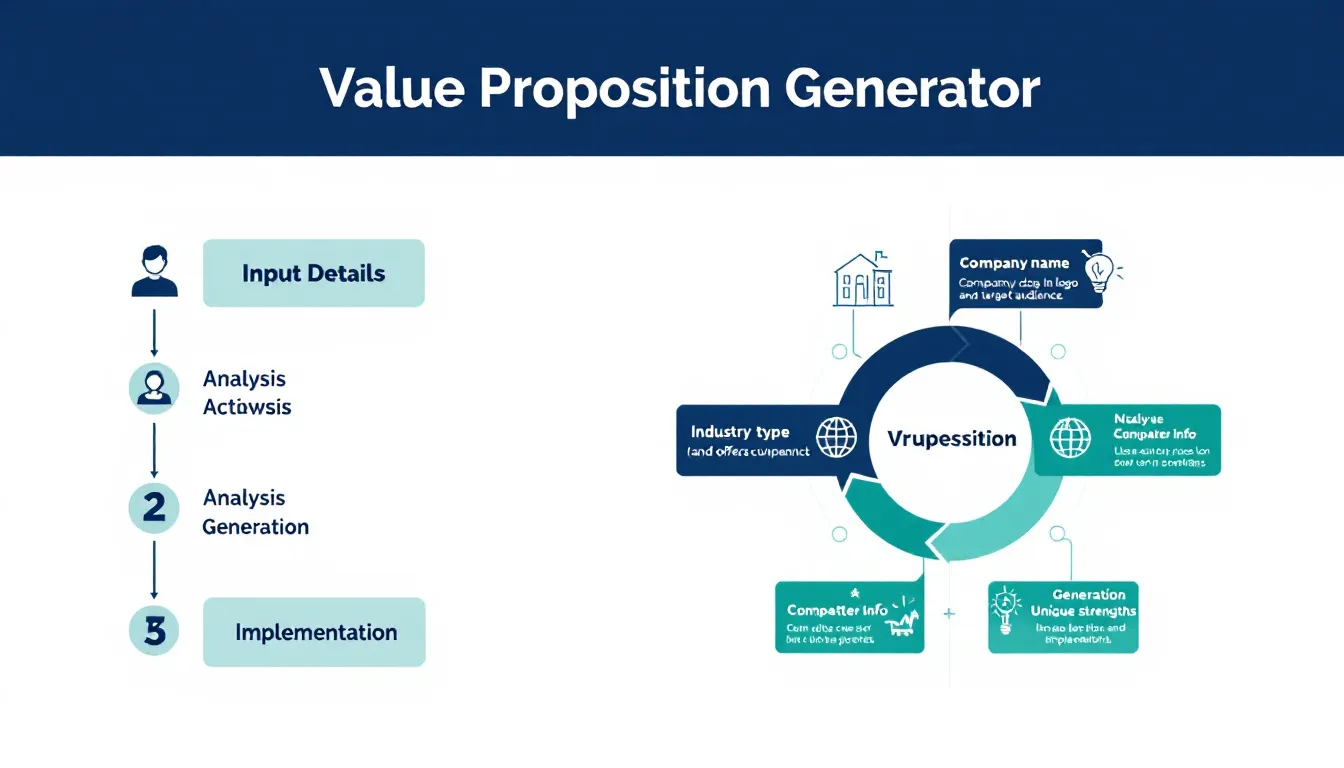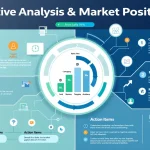Is this tool helpful?
How to Use the Value Proposition Generator Tool Effectively
This comprehensive value proposition generator tool helps businesses create compelling and unique positioning statements. Here’s a detailed guide on how to use each field effectively:
Input Field Instructions
- Company Name: Enter your business name clearly (e.g., “TechFlow Solutions” or “Green Earth Organics”)
- Target Audience: Specify your ideal customer demographic and characteristics (e.g., “Health-conscious millennials in urban areas” or “Enterprise-level manufacturing companies”)
- Industry Type: Define your specific market sector (e.g., “Sustainable Fashion Retail” or “Industrial Automation”)
- Company Offerings: Detail your products or services comprehensively (e.g., “Customized AI-powered manufacturing solutions with predictive maintenance features” or “Organic skincare products made from locally-sourced ingredients”)
- Competitor Information: Outline key competitors and their market positioning (optional but recommended for better results)
- Unique Strengths: Highlight your distinctive capabilities and advantages
Understanding Value Proposition Generation
A value proposition is the cornerstone of your business strategy, communicating the unique value you deliver to customers. This tool utilizes advanced algorithms to analyze your inputs and generate a compelling value proposition that differentiates your business in the marketplace.
Core Components of an Effective Value Proposition
- Problem identification and solution presentation
- Clear articulation of benefits
- Unique differentiators
- Target market alignment
- Competitive advantage statement
Benefits of Using the Value Proposition Generator
Strategic Advantages
- Time-efficient creation of professional value propositions
- Data-driven approach to market positioning
- Consistent messaging framework
- Competitive analysis integration
- Customer-centric focus
Business Impact
- Enhanced market differentiation
- Improved customer communication
- Stronger brand positioning
- Better conversion rates
- Aligned marketing messaging
Addressing Business Needs
The value proposition generator addresses critical business challenges in market positioning and customer communication through:
Market Analysis Integration
By incorporating competitor information and industry context, the tool helps businesses position themselves effectively in their market niche.
Customer-Centric Approach
The tool emphasizes customer needs and pain points, ensuring the value proposition resonates with the target audience.
Practical Applications and Use Cases
Example 1: Technology Startup
Input:
- Company Name: CloudSecure Solutions
- Target Audience: Small to medium-sized enterprises concerned about cybersecurity
- Industry Type: Cybersecurity Software
- Company Offerings: AI-powered threat detection, automated response systems, compliance management
Generated Value Proposition: “CloudSecure Solutions empowers SMEs with enterprise-grade cybersecurity through AI-powered threat detection and automated response systems, ensuring business continuity and compliance at a fraction of traditional security costs.”
Example 2: Sustainable Fashion Brand
Input:
- Company Name: EcoThread Collective
- Target Audience: Environmentally conscious young professionals
- Industry Type: Sustainable Fashion
- Company Offerings: Eco-friendly clothing, carbon-neutral manufacturing, circular fashion initiatives
Generated Value Proposition: “EcoThread Collective transforms sustainable fashion through carbon-neutral manufacturing and circular design, offering style-conscious professionals the opportunity to make a positive environmental impact without compromising on style or quality.”
Industry-Specific Applications
B2B Services
- Professional services firms
- Software companies
- Manufacturing businesses
- Consulting agencies
B2C Products
- Retail brands
- Consumer technology
- Food and beverage
- Lifestyle products
Best Practices for Value Proposition Development
Research and Preparation
- Conduct thorough market research
- Analyze competitor positioning
- Gather customer feedback
- Identify unique selling points
Implementation Strategy
- Test different versions
- Measure customer response
- Refine based on feedback
- Maintain consistency across channels
Frequently Asked Questions
How often should I update my value proposition?
Review and update your value proposition annually or when significant market changes occur, new products launch, or customer needs evolve.
Can I create multiple value propositions for different market segments?
Yes, creating targeted value propositions for different segments can increase effectiveness and relevance.
What makes a value proposition compelling?
A compelling value proposition clearly communicates unique benefits, addresses specific customer pain points, and differentiates from competitors.
How should I use my value proposition?
Integrate your value proposition across marketing materials, website content, sales presentations, and customer communications.
Should startups use different value propositions than established companies?
While the format remains similar, startups often focus more on innovation and problem-solving, while established companies might emphasize track record and reliability.
How can I validate my value proposition?
Test your value proposition through customer interviews, A/B testing on your website, and monitoring conversion rates.
Optimization Tips
Enhancing Your Value Proposition
- Use clear, concise language
- Focus on measurable benefits
- Include proof points
- Maintain brand voice
- Emphasize unique advantages
Common Pitfalls to Avoid
- Generic statements
- Technical jargon
- Unrealistic claims
- Focusing on features instead of benefits
- Ignoring competitor positioning
Important Disclaimer
The calculations, results, and content provided by our tools are not guaranteed to be accurate, complete, or reliable. Users are responsible for verifying and interpreting the results. Our content and tools may contain errors, biases, or inconsistencies. We reserve the right to save inputs and outputs from our tools for the purposes of error debugging, bias identification, and performance improvement. External companies providing AI models used in our tools may also save and process data in accordance with their own policies. By using our tools, you consent to this data collection and processing. We reserve the right to limit the usage of our tools based on current usability factors. By using our tools, you acknowledge that you have read, understood, and agreed to this disclaimer. You accept the inherent risks and limitations associated with the use of our tools and services.







